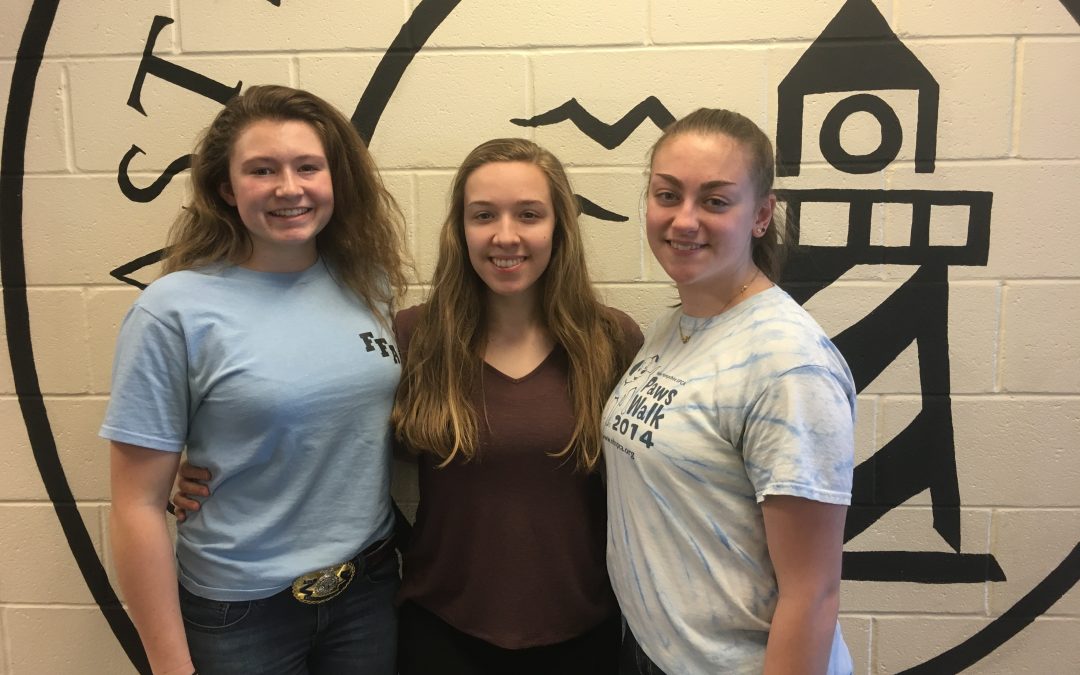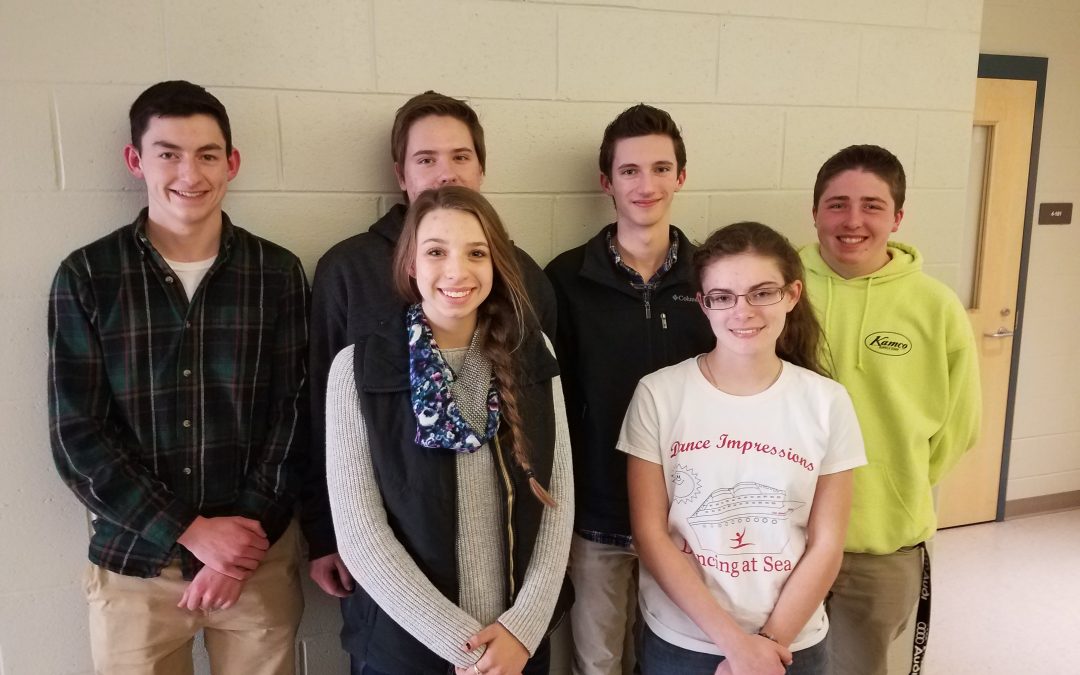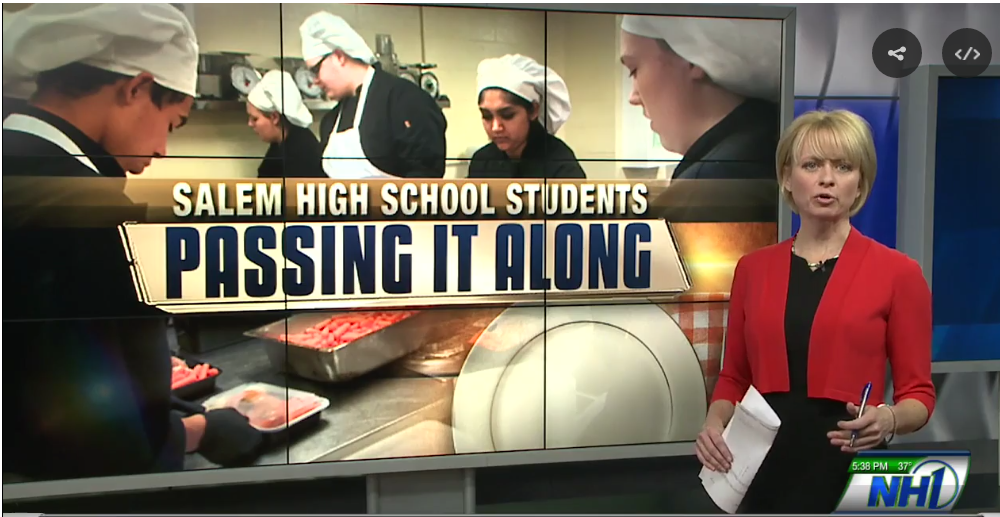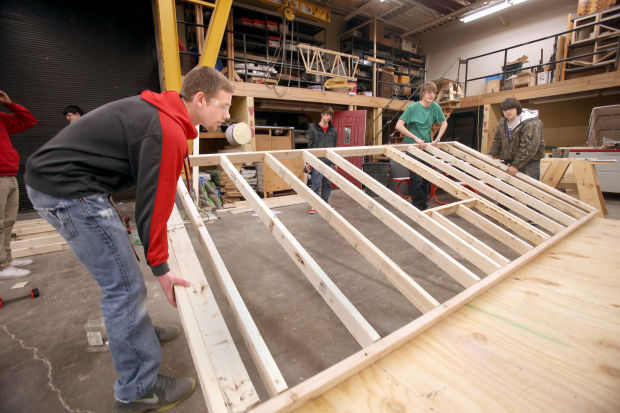
Dec 22, 2016 | Article
With more than 60 enrolled students, Seacoast School of Technology’s Animal & Plant Science program recently saw three of its own—seniors Jalin Marston, Rebecca Bernier and Madelyn Bentz—achieve success at the national level. Competing in October at the National FFA Convention & Expo in Indianapolis, Marston secured a gold while Bernier and Bentz grabbed a silver and bronze, respectively.
Instructor Anne Demarco said she could not be more proud of their accomplishments. “The girls learned a lot—it was an eye-opening experience for them,” she said. “They did outstanding.”
The students qualified for the national competition after winning at the state level with a project in aquaponics where they grew plants by using fish waste in a re-circulating system. At the national convention, students were presented with written tests and asked to participate in a mock press conference about their project with each student fulfilling a particular role. They also presented in front of a panel of national judges with a project proposal that was submitted in August.
“Our job was to focus on one area for the competition, which was agricultural communication, so it involved marketing and journalism,” said Marston. “The purpose was to communicate about an innovative practice to the surrounding communities.”
Demarco said their performance was even more incredible given the fact the students had only worked together for one year. Whereas the programs at SST are two years, she said those of other states are 4 or 6 years. Some CTE programs in NH offer up to 4 years of instruction as well. “Other kids around the country get to specialize where we provide a little bit of everything in our program,” she added.
Noting one relatively new addition to her program is sustainable agriculture, Demarco said there are a number of skills her students are developing in addition to technical knowledge.
“They are definitely learning team work, time management and working under deadlines,” she said. “They are learning perseverance and networking, problem solving. They are also learning to be courteous and respectful, as we send them to other professionals when they are doing research. The students learn a lot of important skills that will transfer across many areas.”
As for the experience at the National FFA Convention & Expo itself, Bentz said they were “really proud” of themselves. She said the takeaway from her participation at the event national convention was that she is not alone in her ambitions. “It was great to see so many students with such passion for agriculture,” she said. “All across the country, there are teenagers who want to make a difference.”
Noting there were substantial expenses incurred to make the trip to the national convention, Bernier said it was worth it. She cited a private donation from the Pomona (5th Degree) Grange for the area East Rockingham Pomona as instrumental in their ability to also enjoy themselves outside of the competition. “We went to a rodeo and concerts—it was a lot of fun,” she said.
According to all three students, Seacoast School of Technology’s Animal & Plant Science program has been a great experience. They each also expressed gratitude at the additional opportunity to participate in the National FFA Organization.
Referring to it as “a family,” Bentz said FFA provides leadership and professional opportunities. “Whenever you wear one of these iconic FFA blue corduroy jackets, the feeling is indescribable,” she said.
Bernier agreed and added, “All of the jackets on the back have the state you are from and the chapter you are in and an emblem that signifies that everyone is together. We are all potentially a family. We respect each other and we are part of the same organization.”
In summing up what she hopes all students ultimately take from Seacoast School of Technology’s Animal & Plant Science program, Demarco cited a “belief” they can solve anything.
“These kids are capable of thinking outside the box with the skills they have developed here,” she said. “I hope they have also developed an appreciation for the huge field of agriculture—it ties into everything and every industry….Whether we are feeding the world, saving the environment, or helping someone’s pet, our field makes the world a better place.”
Photo Credit:
Left to Right: Jalin Marston, Madelyn Bentz and Rebecca Bernier

Dec 22, 2016 | Article
While the existence of robots still seems like science fiction for many parents, today’s students are actively programming and working with them in anticipation of entering an increasingly technology-oriented workplace. Recently, 6 teams from Pinkerton Academy VEX Robotics program tried their hand at designing and programming a robot at Pembroke Academy’s Winter Classic Robotics Competition on Saturday December 3rd.
“Five teams made it to the quarterfinals round and two to the semifinals,” noted Engineering Instructor, and VEX Robotics Advisor Ernie Biron.
Team 241A, however, distinguished itself even further by winning the Design Award for their robot and documentation, which qualifies them for the Regional Finals in February at Manchester Community College.
For Biron, VEX Robotics is unique in its ability to provide a hands-on way for students to learn STEM and how to problem-solve, while also recognizing “the technological wonders around them.” “It shows them how they can become a part of changing the future of technology,” he added.
According to the students themselves, their participation in the program stems from a tangible desire to prepare for this future. “I like [the program] because it gives you a real world outlet,” said Alex Mielens, captain of Team 241A. “We are all thinking ahead—we want to be engineers.”
Fellow participant Nathan Stallings agreed and added, “I personally joined because I want to be a robotic engineer. I want to expand my education and understand how robots work.”
Biron said he is particularly impressed at how the program also demands that students rigorously document their work.
“Students need to keep a running record of how they came up with the design, issues, flaws, corrections, and the engineering and STEM principles used in completing their robots,” he said. “Teams cannot be considered for Design or Excellence awards unless they have a really good document package.”
In addition to learning how to build a robot that meets a specific challenge, the students themselves noted the program also helps build other skills, including team work. Citing ten students on Team 241A, Senior Mike Estes said it can definitely be a challenge to keep everyone involved in the project.
“It’s hard to give work to everybody,” he said. “Everybody is at different grade levels, too—some are freshmen, others are seniors. We run into issues, but work through them.”
Jessica Lacey, a first-year participant in the program, said working in a group has been “an interesting experience.” She said she has been surprised, however, at how working in a group has enhanced her understanding of robotics.
“I’ve worked with VEX parts before, but by working in larger groups I’ve learned a lot from bouncing my ideas off other people and other teams,” she said. “It’s been a huge learning curve for me, but very interesting.”
For younger students unsure as to whether to get involved in a robotics program, first-year participant Stasia Sturdivant said she suggests they attend a competition, which is what she did for her own younger sister.
“I got my 5th grade sister interested by bringing her here during meeting nights, showing videos and bringing her to competitions,” she said. “I think it would piqué a lot of students’ interest.”
In addition to watching his teams perform at and excel in various competitions, Biron said he also especially enjoys the fact that the program continues to grow. Citing this as his 4th year instructing VEX Robotics students, he said his program has more than doubled in size from his first year.
“When I first started, we had only about 20 kids with maybe 10 to 14 coming in consistently,” he said. “Now, I get over 50 and have to turn down some as the teams are way too large at times to be fun.
He said his personal goal is to try and expand the program into Derry’s elementary and middle schools.
“I hope to add more teams as funds or costs come down, but that’s hard as I use the same components to teach my engineering classes,” he said. “For now, I’m just enjoying the hard work put in by our current teams who are representing Pinkerton Academy proudly.”
Biron said he also takes pride in the accomplishment of a former student. “One of my past students started a college team at UNH last year,” he added. “It’s exciting to see that, too.”
Photo Credit:
Pinkerton Academy Vex Robotics students
l-r front row – Jessica Lacey, Stasia Sturdivant ( both first year robotics students)
l-r back row – Mike Estes, Alex Mielens, Nate Stallings, Austin Caux (all 3-4 year robotics students)

Dec 22, 2016 | Culinary Arts, Hospitality, Tid Bits
Salem High School culinary students are preparing hundreds of meals for those in need around their community. Not only do students gain valuable experience in producing large quantities of food, they help out area food banks and homeless shelters in the process. VH1 recently aired a video highlighting the project linked here.
A Go Fund Me page has been established to raise funds for the program.

Nov 29, 2016 | Article
Distracted driving is a societal problem and one that 3 students in Pinkerton Academy’s Video Production program tackled head on this past spring in their production of videos for The Community Alliance for Teen Safety.
Producing, shooting and editing a 30 second, 1 minute, and 90 second video versions, the students involved in the project were seniors Ryan Fuller, Jenelle Giordano, and Allison Patt. Along with screenings at local movie theaters, UNH hockey games, local TV and various events, their video, “Finish Your Story,” was nominated and won a “Student Award of Excellence” from the National Academy of Television Arts and Science. The trio also won a student Emmy from the New England Chapter and were nominated for a National Student Emmy by the Academy.
Expressing excitement at the their achievement, Christopher Lord, teacher of Video Production at Pinkerton Academy, said the students did a tremendous amount of work in creating the videos.
“We coordinated with Derry TV and Fire to act as talent and provide ambulances, fire trucks, and cruisers for our accident reenactment scene,” he said. “We hired a local makeup artist to do the gory post accident scenes and convinced a local junkyard to provide us with a couple smashed up cars to finish setting the scene.”
He said they even received some help from students in the culinary arts program. “They chopped us some onions to help a student actor to cry while telling the story of his accident,” he added.
For Lord, one of the highlights of the entire experience was watching the live student Emmys in class and seeing Jeopardy’s Alex Trebec announcing Pinkerton Academy as a nominee for best PSA.
He said another highlight was the quality of the students’ work, including pre-production elements, which helped to shape “ a different kind of distracted driving video.”
“The students surveyed classmates about what they found distracted them the most while driving,” he said. “This survey sent us in an unexpected direction beyond the obvious ‘texting while driving’ and instead found that other kids in the car did silly things, followed GPS systems, and searched songs on their I-Pods. [These things] were what students felt took their eyes and minds off the road the most.”
For Giordano, the entire project represented an incredible opportunity to collaborate with numerous people and entities outside of Pinkerton Academy. She said the biggest challenge was shooting the videos in 5 hours during which time all actors received their special effect makeup done, cars were flipped over and repositioned, and windshields were broken among other elements.
“Although the PSA is short, a lot of time and effort went into creating it,” she explained. “We spent weeks planning and organizing it…I can’t express how grateful I am for the experience. It was just a taste of what I hope my future holds.”
It is a future she believes Pinkerton Academy has helped shape.
“Joining video production at Pinkerton has shaped my future and nurtured my love for film,” she said. “Pinkerton’s video production classes have prepared me as much as they could for the future industry.”
Currently attending Santa Barbara City College online school, Giordano said she will be moving out to Los Angeles in January in hopes to start working in the tv/film industry in Hollywood.
“Chris Lord gave Allie, Ryan, and I so much opportunity with the films we created,” she said. “He believed in our films enough to enter them into many film festivals–and because of that, our resumes have been built up from all of our nominations and wins. I can’t thank Pinkerton Academy and Chris Lord enough for all they have done for me in preparing me for my future.”
To see the full PSA Version for Broadcast, click https://vimeo.com/170480039.

Nov 7, 2016 | Article, Uncategorized
Sometimes, youth must think “tiny” in order to dream big, which is a metaphorical concept that will come to life for about 100 Career and Technical Education (CTE) students in the next 4 to 5 months. Representing 4 CTE centers from across NH, these students will build 5 “tiny” homes as part of a competition and workforce-development initiative developed by the New Hampshire Home Builders Association (NHHBA) and The New Hampshire Lottery.
According to NHHBA Business Development Director Scott Palmer, the initiative underscores a very real need in the workforce.
“The companies involved in this project all have this problem—there is too much work and not enough workers,” he said. “Having something like this that develops relationships with kids really appeals to everybody.”
The stakes are fairly high for the students, too, as the tiny homes must all be completed by March for the 50th annual New Hampshire State Home Show in Manchester. At the show, judges will declare the winning house, which will be won by the individual who comes in second place in “Tiny House Big Money,” a new scratch ticket game that begins in January. The winner will win $10,000, while the houses that do not win will be auctioned or raffled off with proceeds divided in several ways.
“When the houses sell, some of the funds will go to the schools and some will go to a local NHHBA chapter,” said Palmer. “Money will also go towards our Hammer for Veterans program, which provides professional home construction related services to veterans and their families…We hope we can make enough money to keep this tiny home building initiative going annually.”
As for what the students learn from participating in the program, NHHBA Member Al Lawrence, who owns Artisan Electrical Contractors and will donate his time to check the electrical work of all student teams, the initiative is important.
“It’s a real-life scenario where they can see everything that goes into building a home,” he said. “These homes may be tiny, but they need to be built like any other home…I am all for this project and look forward to doing whatever I can to mentor these students and hopefully help to spark their interest in a career in the trades.”
In directly connecting professionals from industry with the students, Palmer said it is their collective hope that the program can help “bridge a gap.”
“If we can get these kids to understand this is a good industry and that they can make a good living, that would be great,” he said.
Palmer said another outcome from the competition/initiative would be an enhanced understanding regarding the industry itself.
“It’s not just swinging a hammer—this is a very modern industry that is very technology focused,” he added. “It is incredible how homes are built and everything else that goes into it.”
For Lawrence, the project underscores a subtle point.
“We need to get kids excited about the trades,” he said. “It’s rapidly evolving and technology has changed many of the tools we use today. Whatever most people think about the trades, the reality is there is more room for growth than people realize. This tiny home initiative is as exciting for us already in the trades as it is for the kids.”
Participating students are from Alvirne High School in Hudson, the Huot Technical Center in Laconia, Kennett High School in North Conway and the Seacoast School of Technology in Exeter.
To learn more about NHHBA, visit www.nhhba.com.





